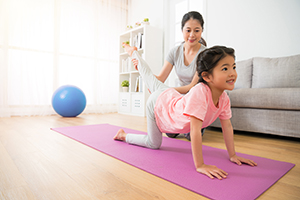Facing Stress as a Family
 Within the last two unprecedented years, parents everywhere have been experiencing novel situations of stress.[1] Stress can be good for the body, but in the long term, it often causes more bad than good. Chronic stress can make our body’s immune defences weaker.[2] Many parents continue to accumulate this stress as the new school year starts, and they are noticing its effects on themselves and their children.[3] We cannot control the current pandemic, but we can absolutely control how we respond to it. Let’s focus on solutions and prevention.
Within the last two unprecedented years, parents everywhere have been experiencing novel situations of stress.[1] Stress can be good for the body, but in the long term, it often causes more bad than good. Chronic stress can make our body’s immune defences weaker.[2] Many parents continue to accumulate this stress as the new school year starts, and they are noticing its effects on themselves and their children.[3] We cannot control the current pandemic, but we can absolutely control how we respond to it. Let’s focus on solutions and prevention.
Our body was built to react to stress with the “fight-or-flight” response, also known as the sympathetic nervous system. This physiological response helps us fight off invaders or run away from them. But our body does not distinguish between the stressors it was originally built to react to and modern-day stressors. A stressor in the past might easily have been a carnivorous animal chasing you, while a present-day stressor can look like accumulating work deadlines, struggling to keep grades up, an argument with your child, or chores to be completed at home. Our lifestyle has changed with evolving technology, but our biological response has remained the same.
Issues start showing when stressors are constant and simultaneous. When your body is constantly in a stress response, there is no time for a break or closure of previous stressors. Your body essentially is lacking adequate time in the opposite, balancing response of the parasympathetic nervous system: “rest and digest.” This system is responsible for an optimal immune function.
Chronic stress is shown to negatively affect the immune system,[4] amongst many other health concerns it can cause. Parents are noticing that they are inadvertently carrying this heightened stress [5] and decreased immunity into the household, affecting their children in the same way.
Children might not completely understand the intricacies of raising a family, politics, or world news, but they are sensitive to changes in tension, mood, or stress at home.[6]
A lowered immunity in both adults and children makes viral infections more likely, especially during the cold-and-flu season. Because symptoms of respiratory viral infections are quite similar from one to another, minor colds have often been overmanaged in precautions of it being COVID-19 since the last two years. COVID-19 protocols have forced out-of-the-ordinary changes in people’s routines, causing increased stress for all. Stress, lowered immunity, higher chances of infection, routine interruptions, stress—uncertainty is creating a vicious circle.
There is nothing much to do about the presence of stressors in one’s life, but the way stress is managed is what makes a world of difference. Here are some strategies that have been shown to encourage the body to come out of the “fight-or-flight” mode and to spend more time in “rest and digest.”
Movement
Exercise being good for health is nothing new. The type of exercise is what is the most important: moderate-intensity cardio exercise. To make it easier to remember, choose a physical activity that will get you breathing faster, but not out of breath, and still be able to carry a conversation. Thinking of it more as movement rather than exercise may feel less of a task for some people.
Laughter
Laughter reduces the stress hormones cortisol and epinephrine, while positively affecting your happiness and pleasure hormones, dopamine, and serotonin.[7]
Breathing Exercises
One of the most noticeable aspects that changes when we are stressed is our breath. Some people are so used to short shallow breaths that it has become normal for them. Focusing to make our breaths longer and deeper is one of the most tangible ways to shift our system from sympathetic to parasympathetic.[8]
Nature
Being in nature has been shown to have so many benefits, all related to the parasympathetic system. It decreases pulse, heart rate, blood pressure, muscle tension, as well as cortisol (the stress hormone); and it improves immune function.[9]
The name of the parasympathetic system tells all: “rest and digest.” For optimal digestion, create encouraging habits and a supporting environment around it.
-
Chew Your Food: Focusing on chewing is often a simple tip to bring awareness and to slow down eating. Counting how many times you chew before you swallow may be enough to make you realize how fast you’ve been eating! Chewing each bite 10–15 times is good for digestive health and helps to reduce stress
-
Take Away Distractions: Many see eating as another task to be checked off during the day. If it is done while trying to complete a task that raises the stress response (e.g., work deadlines), it is no surprise that the parasympathetic system is not getting all the attention it deserves.
What we put into our bodies is as equally important as how we eat it. Certain ingredients and herbs are known to help with stress and immunity.
-
Lavender: This essential oil is well-known in aromatherapy for its relaxing effects.[10] Taken internally in capsules increases its stress-reducing effects.[11]
-
Magnesium: It helps with both the psychological and the physical consequences of stress. Magnesium helps lower stress and relaxes tight muscles.[12]
-
Vitamin D: Vitamin D is increasingly found to affect the body positively when adequate levels are reached. Both stress reduction [13] and immunity [14] benefit from this ingredient.
-
Tryptophan: It is a precursor of serotonin, our key hormone that stabilizes our mood. It can be found in eggs, oats, cashews, and collard greens. It is also available as a supplement for more concentrated dosages.
The pandemic has created and will likely continue to create stress for many. Proactive stress management will prevent consequences of chronic stress and also prevent stress from being passed onto children. With lifestyle changes, encouraging parasympathetic system activities and specific ingredients to include in their diet and nutrition, families can start sustainable changes to the vicious cycle that stress can create.
 Dr. Juliana Rosario Yeung, ND, BSc Agr, BSc
Dr. Juliana Rosario Yeung, ND, BSc Agr, BSc
Dr. Juliana is a mother and a naturopath passionate to guide other parents into their naturopathic journey of parenthood. She supports whatever stage one may be in: preconception, pregnancy, and postpartum.
drjulianand.com
References
-
Spinelli, M., F. Lionetti, M. Pastore, and M. Fasolo. “Parents’ stress and children’s psychological problems in families facing the COVID-19 outbreak in Italy.” Frontiers in Psychology, Vol. 11 (2020): 1713.
-
Morey, J.N., I.A. Boggero, A.B. Scott, and S.C. Segerstrom. “Current directions in stress and human immune function.” Current Opinion in Psychology, Vol. 5 (2015): 13–17.
-
Spinelli et al. “Parents’ stress and children’s psychological problems.”
-
Morey et al. “Current directions in stress and human immune function.”
-
Spinelli et al. “Parents’ stress and children’s psychological problems.”
-
Spinelli et al. “Parents’ stress and children’s psychological problems.”
-
Bennett, M.P., J.M. Zeller, L. Rosenberg, and J. McCann. “The effect of mirthful laughter on stress and natural killer cell activity.” Alternative Therapies in Health and Medicine, Vol. 9, No. 2 (2003): 38–45.
-
Hopper, S.I., S.L. Murray, L.R. Ferrara, and J.K. Singleton. “Effectiveness of diaphragmatic breathing for reducing physiological and psychological stress in adults.” JBI Database of Systematic Reviews and Implementation Reports, Vol. 17, No. 9 (2019): 1855–1876.
-
Li, Qing. “[Effect of forest bathing (shinrin-yoku) on human health: A review of the literature]” (article in French). Santé Publique, S1 (HS) (2019): 135–143.
-
Perry, R., R. Terry, L.K. Watson, and E. Ernst. “Is lavender an anxiolytic drug? A systematic review of randomised clinical trials.” Phytomedicine, Vol. 19, No. 8–9 (2012): 825–835.
-
Kasper, S., M. Gastpar, W.E. Müller, H.-P. Volz, H.-J. Möller, A. Dienel, and S. Schläfke. “Silexan, an orally administered Lavandula oil preparation, is effective in the treatment of ‘subsyndromal’ anxiety disorder: A randomized, double-blind, placebo controlled trial.” International Clinical Psychopharmacology, Vol. 25, No. 5 (2010): 277–287.
-
Seelig, M.S. “Consequences of magnesium deficiency on the enhancement of stress reactions; preventive and therapeutic implications (a review).” Journal of the American College of Nutrition, Vol. 13, No. 5 (1994): 429–446.
-
Eid, A., S. Khoja, S. AlGhamdi, H. Alsufiani, F. Alzeben, N. Alhejaili, H.O. Tayeb, and F.I. Tarazi. “Vitamin D supplementation ameliorates severity of generalized anxiety disorder (GAD).” Metabolic Brain Disease, Vol. 34, No. 6 (2019): 1781–1786.
-
Rees, J.R., K. Hendricks, E.L. Barry, J.L. Peacock, L.A. Mott, R.S. Sandler, R.S. Bresalier, M. Goodman, R. M. Bostick, and J.A. Baron. “Vitamin D3 supplementation and upper respiratory tract infections in a randomized, controlled trial.” Clinical Infectious Diseases, Vol. 57, No. 10 (2013): 1384–1392.

 Stores
Stores